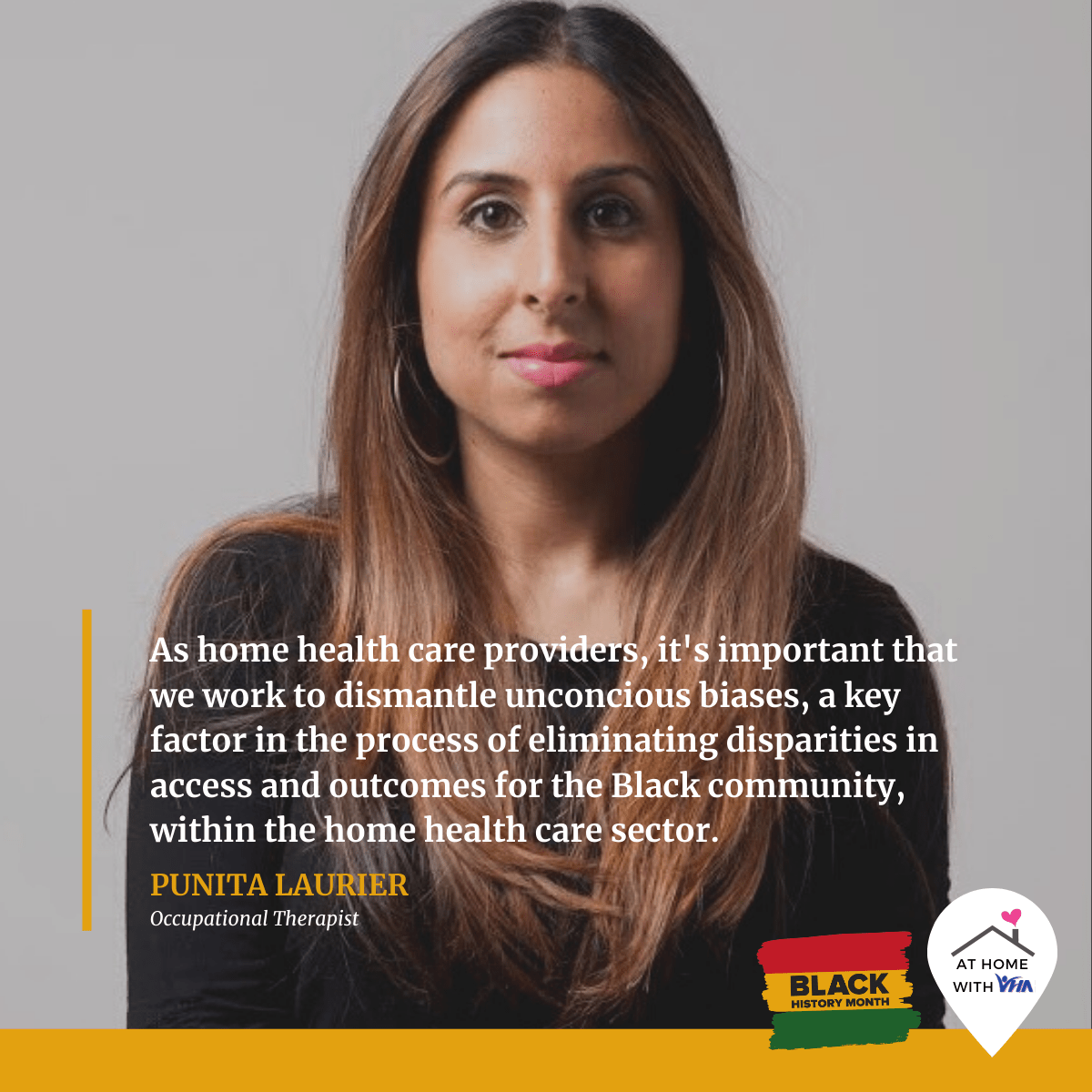At Home with VHA: Meet Punita Laurier, Occupational Therapist

Every role at VHA contributes to something amazing. At Home with VHA tells the stories of those who make up VHA Home HealthCare. In honour of Black History Month this year, we’re shining a light on members of VHA’s Anti-Black Racism Action Group as they advocate for and work towards positive change in their work and in their communities. Meet Punita Laurier, Occupational Therapist (OT).
What do you love most about your role at VHA?
I love being able to put on different hats!
My Occupational Therapy hat – I enjoy being on the front-line helping people in the community and challenging myself with complex cases. Being an OT means using problem solving and analytical skills on a daily basis, as well as thinking outside of the box. It keeps my brain charged and I learn something new every day!
My Leadership hat – Being a Clinical Lead for the Central North region has been a highlight of my time with VHA. I am able to support my team through difficult situations in the community and use a coaching approach to assist them when trying to come up with solutions. I also appreciate being involved in various projects at VHA, whether it be business-related, best practice, or education, to name a few.
My Allyship hat – This year I joined the Anti-Black Racism Action Group at VHA as a Co-Lead for the Policy and Communication Subgroup. Being able to contribute to such an important and long overdue human rights crisis is something I’ve been eager to be a part of for a long time. I’m thankful VHA has provided me with that opportunity.
How does Occupational Therapy make a positive difference for clients and their families?
Occupational Therapy is a holistic approach. I think Clients and their families appreciate this, because we look at all aspects of the person and their environment. Supporting people to live safely in their homes dignifies our Clients and leaves them with a sense of autonomy and belonging. Furthermore, I believe our role as community OTs has become more important now than ever before. Since the beginning of this pandemic, OTs have been working diligently to keep Clients safe in their homes, so they do not end up in hospital due to a fall, pressure sore, or a general failure to cope.
We know that home is the safest place for our Clients to be. lessening the burden on hospitals by keeping Clients healthy at home is an integral part of helping in the fight of COVID-19.
What inspired you to join VHA’s Anti-Black Racism group?
I’ve witnessed racism while working in the community, not necessarily directed towards me, but directed towards the Black community, whether it be microaggressions or overt racism. It always angered me when I experienced this, but I never knew how to respond on the job. On a personal note, I have a Black husband and two Black children. This has given me a first-hand look at the barriers my family faces in terms of how they have to navigate through life and live through racism every single day, whether it be subtle or explicit. I would like things to be different for my children and the rest of the future generation. The tip of the iceberg for me was the devastating death of George Floyd. It fueled a fire in me that I could not deny, and I knew I had to do something. I educated myself, started having difficult conversations with people, and decided from then on, that silence was no longer an option. I was pleasantly surprised when the Anti-Black Racism Action Group was announced at VHA and I did not hesitate to sign up.
What do you hope to achieve through the Action Group and why is it important that those who work in home care contribute to the conversation?
Through the action group, I hope we can achieve an overall cohesiveness within the organization in terms of understanding the impact of racism towards the Black community and how current barriers stem from past systems that were built to oppress. These systems will continue to impact the future generation if we don’t put a stop to them now. It’s truly when that “ah-ha” moment happens, that people really start breaking down their walls and opening up to having those difficult conversations. As part of the Policy and Communication subgroup, we hope to further create anti-racism and inclusion policies that allow VHA staff to feel more supported and heard.
As home health care providers, it’s important that we recognize our own unconscious biases so that we treat our clients with equality. Dismantling those biases is a key factor in the process of eliminating disparities in access and outcomes for the Black community, within the home health care sector.
Anything else you’d like to add?
There is a quote by Barack Obama that I find very inspiring. He says: “Change will not come if we wait for some other person or some other time. We are the ones we’ve been waiting for. We are the change that we seek.” Let’s get to work.
